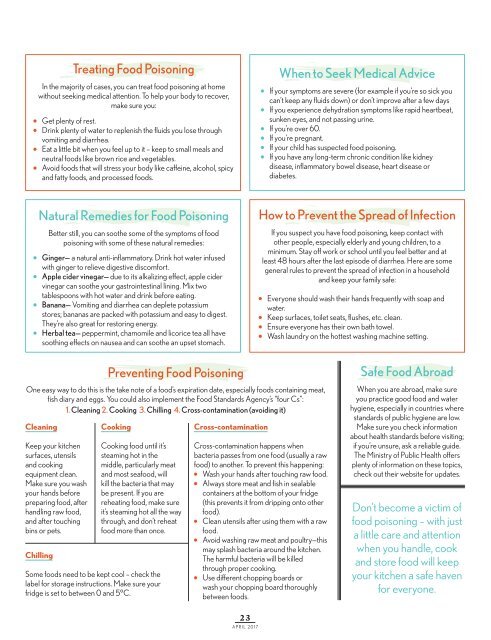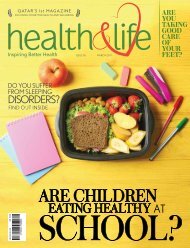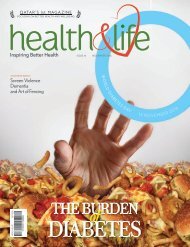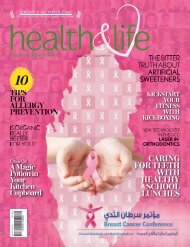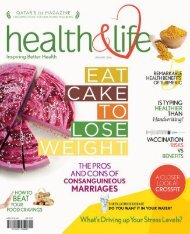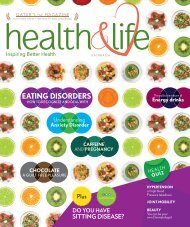Health & Life Magazine April 2017
Health & Life Magazine April 2017 www.health-n-life.com
Health & Life Magazine April 2017
www.health-n-life.com
You also want an ePaper? Increase the reach of your titles
YUMPU automatically turns print PDFs into web optimized ePapers that Google loves.
Treating Food Poisoning<br />
In the majority of cases, you can treat food poisoning at home<br />
without seeking medical attention. To help your body to recover,<br />
make sure you:<br />
Get plenty of rest.<br />
Drink plenty of water to replenish the fluids you lose through<br />
vomiting and diarrhea.<br />
Eat a little bit when you feel up to it – keep to small meals and<br />
neutral foods like brown rice and vegetables.<br />
Avoid foods that will stress your body like caffeine, alcohol, spicy<br />
and fatty foods, and processed foods.<br />
When to Seek Medical Advice<br />
If your symptoms are severe (for example if you’re so sick you<br />
can’t keep any fluids down) or don’t improve after a few days<br />
If you experience dehydration symptoms like rapid heartbeat,<br />
sunken eyes, and not passing urine.<br />
If you’re over 60.<br />
If you’re pregnant.<br />
If your child has suspected food poisoning.<br />
If you have any long-term chronic condition like kidney<br />
disease, inflammatory bowel disease, heart disease or<br />
diabetes.<br />
Natural Remedies for Food Poisoning<br />
Better still, you can soothe some of the symptoms of food<br />
poisoning with some of these natural remedies:<br />
Ginger— a natural anti-inflammatory. Drink hot water infused<br />
with ginger to relieve digestive discomfort.<br />
Apple cider vinegar— due to its alkalizing effect, apple cider<br />
vinegar can soothe your gastrointestinal lining. Mix two<br />
tablespoons with hot water and drink before eating.<br />
Banana— Vomiting and diarrhea can deplete potassium<br />
stores; bananas are packed with potassium and easy to digest.<br />
They’re also great for restoring energy.<br />
Herbal tea— peppermint, chamomile and licorice tea all have<br />
soothing effects on nausea and can soothe an upset stomach.<br />
How to Prevent the Spread of Infection<br />
If you suspect you have food poisoning, keep contact with<br />
other people, especially elderly and young children, to a<br />
minimum. Stay off work or school until you feel better and at<br />
least 48 hours after the last episode of diarrhea. Here are some<br />
general rules to prevent the spread of infection in a household<br />
and keep your family safe:<br />
Everyone should wash their hands frequently with soap and<br />
water.<br />
Keep surfaces, toilet seats, flushes, etc. clean.<br />
Ensure everyone has their own bath towel.<br />
Wash laundry on the hottest washing machine setting.<br />
Cleaning<br />
Keep your kitchen<br />
surfaces, utensils<br />
and cooking<br />
equipment clean.<br />
Make sure you wash<br />
your hands before<br />
preparing food, after<br />
handling raw food,<br />
and after touching<br />
bins or pets.<br />
Chilling<br />
Some foods need to be kept cool – check the<br />
label for storage instructions. Make sure your<br />
fridge is set to between 0 and 5°C.<br />
Preventing Food Poisoning<br />
One easy way to do this is the take note of a food’s expiration date, especially foods containing meat,<br />
fish diary and eggs. You could also implement the Food Standards Agency’s “four Cs”:<br />
1. Cleaning 2. Cooking 3. Chilling 4. Cross-contamination (avoiding it)<br />
Cooking<br />
Cooking food until it’s<br />
steaming hot in the<br />
middle, particularly meat<br />
and most seafood, will<br />
kill the bacteria that may<br />
be present. If you are<br />
reheating food, make sure<br />
it’s steaming hot all the way<br />
through, and don’t reheat<br />
food more than once.<br />
Cross-contamination<br />
Cross-contamination happens when<br />
bacteria passes from one food (usually a raw<br />
food) to another. To prevent this happening:<br />
Wash your hands after touching raw food.<br />
Always store meat and fish in sealable<br />
containers at the bottom of your fridge<br />
(this prevents it from dripping onto other<br />
food).<br />
Clean utensils after using them with a raw<br />
food.<br />
Avoid washing raw meat and poultry—this<br />
may splash bacteria around the kitchen.<br />
The harmful bacteria will be killed<br />
through proper cooking.<br />
Use different chopping boards or<br />
wash your chopping board thoroughly<br />
between foods.<br />
Safe Food Abroad<br />
When you are abroad, make sure<br />
you practice good food and water<br />
hygiene, especially in countries where<br />
standards of public hygiene are low.<br />
Make sure you check information<br />
about health standards before visiting;<br />
if you’re unsure, ask a reliable guide.<br />
The Ministry of Public <strong>Health</strong> offers<br />
plenty of information on these topics,<br />
check out their website for updates.<br />
Don’t become a victim of<br />
food poisoning – with just<br />
a little care and attention<br />
when you handle, cook<br />
and store food will keep<br />
your kitchen a safe haven<br />
for everyone.<br />
23<br />
APRIL <strong>2017</strong>


